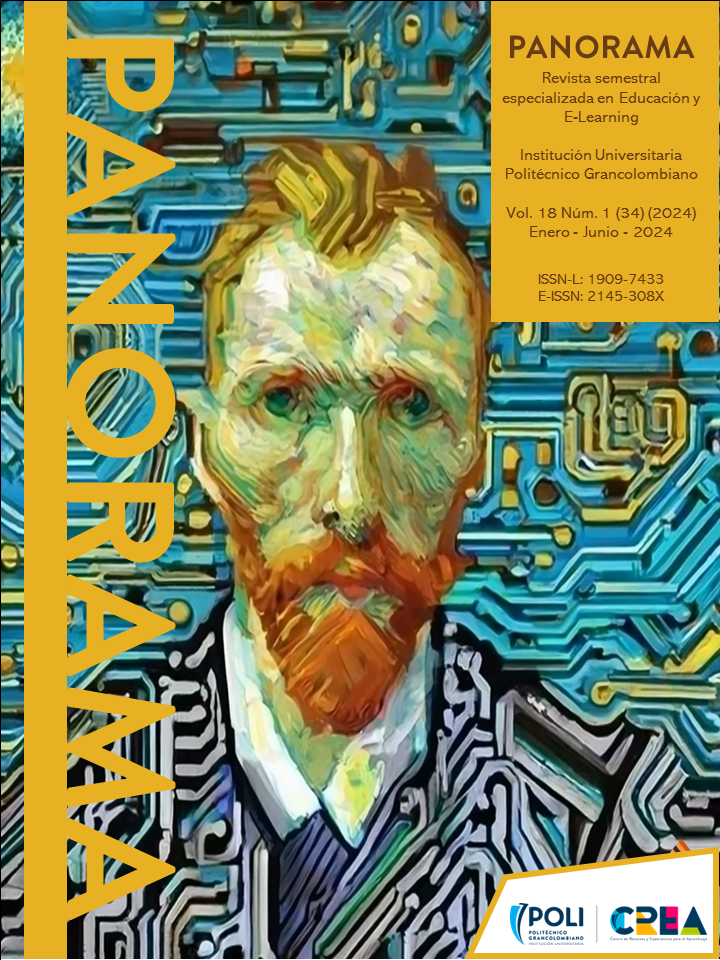Resumen
La inteligencia artificial (IA) está irrumpiendo en todos los ámbitos de nuestras vidas, y la educación no es una excepción. Esta tecnología, cada vez más sofisticada, ofrece un potencial transformador para revolucionar los métodos de enseñanza y aprendizaje tradicionales.
Referencias
Acevedo, E. E. N. (2019). Nuevos lenguajes para aprendizaje virtual herramientas para los escenarios de aprendizaje. Panorama, 13(24), 5–7. https://doi.org/10.15765/PNRM.V13I24.1214
Andreu, J. M. P. (2022). Sistematic review about evaluation of gamification in seven educational disciplines. Teoria de la Educación, 34(1), 189–214. https://doi.org/10.14201/TERI.27153
Apablaza-Campos, A., & Wilches Tinjacá, J. A. (2024). Inteligencia artificial para la generación de contenidos en Iberoamérica. Iniciación Científica. https://doi.org/10.15765/LIBROSIC.V5I60.53
Arias-Velandia, N., Rincón-Báez, W., Rojas-Tolosa, S. M., Moreno-Jiménez, Y. J., & Daza-Orozco, C. E. (2022). Panorama bibliográfico sobre actividades deficiencia, logro de aprendizaje y formación de vocaciones científicas en educación básica y media.
Barroso-Moreno, C., Rayon-Rumayor, L., & García-Vera, A. B. (2023). Big Data and Business Intelligence on Twitter and Instagram for digital inclusion | Big Data y Business Intelligence en Twitter e Instagram para la inclusión digital. Comunicar, 30(74), 45–56. https://doi.org/10.3916/C74-2023-04
Black, D., Bissessar, C., & Boolaky, M. (2019). Online Education as an Opportunity Equalizer: The Changing Canvas of Online Education. Interchange. https://doi.org/10.1007/s10780-019-09358-0
Bliquez, R., & Deeken, L. (2016). Hook, Line and Canvas: Launching a Professional Development Program to Help Librarians Navigate the Still and Stormy Waters of Online Teaching and Learning. Journal of Library and Information Services in Distance Learning, 10(3–4), 101–117. https://doi.org/10.1080/1533290X.2016.1206778
Carroll, A. J., Tchangalova, N., & Harrington, E. G. (2016). Flipping one-shot library instruction: Using Canvas and Pecha Kucha for peer teaching. Journal of the Medical Library Association, 104(2), 125–130. https://doi.org/10.3163/1536-5050.104.2.006
Daza-Orozco, C. E., Luque-Forero, A. C., & Padilla-Murcia, E. (2022). Educación superior: sustentabilidad y prácticas innovadoras. Editorial Politécnico Internacional, 370.
Daza-Orozco, C.E.; Norman-Acevedo, E. (2019). Iniciación Científica Conceptualización, metodologías y buenas prácticas. Institución Universitaria Politécnico Grancolombiano.
Estrada-Araoz, E. G., Manrique-Jaramillo, Y. V., Díaz-Pereira, V. H., Rucoba-Frisancho, J. M., Paredes-Valverde, Y., Quispe-Herrera, R., & Quispe-Paredes, D. R. (2024). Assessment of the level of knowledge on artificial intelligence in a sample of university professors: A descriptive study | Evaluación del nivel de conocimiento sobre inteligencia artificial en una muestra de docentes universitarios: Un estudio descriptiv. Data and Metadata, 3. https://doi.org/10.56294/dm2024285
Flores-Bueno, D., Limaymanta, C. H., & Uribe-Tirado, A. (2021). The gamification in the development of information literacy from the perspective of university students. Revista Interamericana de Bibliotecologia, 44(2). https://doi.org/10.17533/UDEA.RIB.V44N2E342687
García-Peñalvo, F. J., Llorens-Largo, F., & Vidal, J. (2024). The new reality of education in the face of advances in generative artificial intelligence | La nueva realidad de la educación ante los avances de la inteligencia artificial generativa. RIED-Revista Iberoamericana de Educacion a Distancia, 27(1), 9–39. https://doi.org/10.5944/ried.27.1.37716
Jara-Abanto, F., Velasquez-Medina, L., & Meneses-Claudio, B. (2023). Machine learning for the improvement of adaptive learning in university education. Salud, Ciencia y Tecnología - Serie de Conferencias, 2. https://doi.org/10.56294/sctconf2023473
Miranda, R. C. & Ayoub, E. (2016). Circus practices in the “Loom” of initial training in physical education: New textures in addition to the canvas. Movimento, 22(1), 187–198. https://www.scopus.com/inward/record.uri?eid=2-s2.0-84975699552&partnerID=40&md5=8d65cad621d84297d98b02d205b903d5
Norman-Acevedo, E. (2018a). Educación virtual: Una oportunidad para la competividad y el desarrollo. https://journal.poligran.edu.co/index.php/libros/article/view/1749
Norman-Acevedo, E. (2018b). Rompiendo Barreras, 10 Años de la Educación Virtual en el Politécnico Grancolombiano. Institución Universitaria Politécnico Grancolombiano. http://alejandria.poligran.edu.co/handle/10823/1146
Norman-Acevedo, E., Norman-Acevedo, E., & Trujillo-Flórez, L. M. (2023). Rol del tutor 4.0 en el proceso pedagógico, a la luz de una humanidad digital. Panorama, 17(33), 1–8. https://doi.org/10.15765/pnrm.v17i33.4168
Núñez, A., Tala, Á, Astudillo, M., Varela, I., Polit, A., & Badell, J. S. (2024). Machine Learning: A training need today for tomorrow’s physicians | Machine Learning: Una necesidad formativa hoy para los médicos del mañana. Revista Chilena de Anestesia, 53(1), 16–20. https://doi.org/10.25237/revchilanestv53n1-04
Parra-González, M. E., Segura-Robles, A., & Romero-García, C. (2020). Analysis of creative thinking and levels of student activation after a gamification experience. Educar, 56(2), 475–489. https://doi.org/10.5565/REV/EDUCAR.1104
Rojas Berrío, Sandra. Sánchez Torres, Marcel, & Topete Barrera, Carlos. (2014). Modelos de evaluación del desempeño de las actividades científicas. 152.
Wilches-Tinjacá, J. A.; Castiblanco-Roldán, A.; Daza-Orozco, C.E. (2023). Gestos, tecnologías y sociedades: tendencias y emergencias en tiempos de pospandemia. Politécnico Internacional, 1-250.
Wilches-Tinjacá, J. A., López, M. E. S., & Daza-Orozco, C. E. (2022). Todo tiempo pasado (no) fue mejor: educación para el futuro y tecnologías posthumanas en el redimensionamiento de lo público-privado. Politécnico Internacional, 223-245

Esta obra está bajo una licencia internacional Creative Commons Atribución-NoComercial-SinDerivadas 4.0.
Derechos de autor 2024 Panorama





